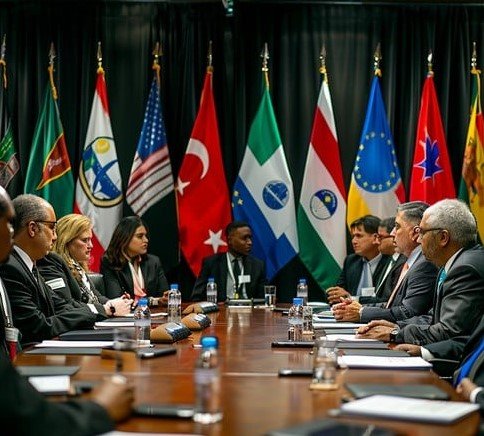Qatar’s Prime Minister Mohammed bin Abdulrahman Al Thani plans to arrive in Egypt on Monday to discuss a potential hostage deal with key mediators. This move comes amid urgent efforts to secure the release of hostages held in Gaza, as Egypt and Qatar push an updated ceasefire proposal to Hamas.
Background on the Hostage Crisis
The hostage situation stems from the October 7, 2023 attacks by Hamas on Israel, which led to over 1,200 deaths and the capture of around 250 people. Many hostages remain in Gaza after partial releases in late 2023 and early 2024.
Talks have dragged on for months, with mediators like Qatar, Egypt, and the United States working to bridge gaps between Israel and Hamas. Recent escalations in Gaza, including Israeli military advances, have raised the stakes. Sources indicate that Hamas received a fresh proposal over the weekend, demanding a quick response from the group.
This latest push follows reports of Mossad chief David Barnea’s recent meetings in Doha with Qatari leaders. Those discussions focused on broader ceasefire terms but touched on hostage releases.
Key Players in the Negotiations
Qatar has played a central role as a mediator, hosting Hamas leaders and facilitating talks. Its prime minister’s visit to Egypt highlights a joint effort with Cairo to advance the deal.

Egypt, sharing a border with Gaza, has been vital in humanitarian aid and border management. Egyptian intelligence officials have met with Hamas representatives multiple times this year.
- United States: Actively involved, with envoys like Steve Witkoff pushing for progress.
- Israel: Led by Prime Minister Benjamin Netanyahu, who insists on a full release of all hostages.
- Hamas: The group holds the hostages and demands an end to the war and Israeli withdrawal from Gaza.
Other nations, such as Turkey, have emerged in recent proposals as potential guarantors for any agreement.
Details of the Proposed Deal
The updated proposal from Egypt and Qatar calls for a comprehensive release of all hostages, both living and deceased, in exchange for ending the war and pulling Israeli forces from Gaza. Arab media reports suggest this could include phased steps, starting with vulnerable hostages like women and children.
Sources close to the talks say the plan aims to prevent further Israeli advances into Gaza City. Hamas has shown some flexibility, reportedly agreeing to keep hostages alive if Israel partially withdraws.
| Timeline of Recent Events | Date | Key Development |
|---|---|---|
| July 2025 | Mossad chief meets Qatari PM in Doha | Discussions on ceasefire and hostages begin anew. |
| August 8, 2025 | Arab sources report new proposal | Egypt and Qatar push for all-hostage release. |
| August 14, 2025 | Hamas delegation in Egypt | Talks on comprehensive deal intensify. |
| August 18, 2025 | Qatar PM arrives in Egypt | Meeting with mediators to finalize response. |
This table shows how events have built up quickly in recent weeks, reflecting the urgency amid ongoing fighting.
Israel’s Firm Stance
Israel’s government has made it clear it will only accept a deal that frees all hostages at once. The Prime Minister’s Office stated this position firmly on Saturday, rejecting any partial agreements.
Officials warn that prolonged negotiations could endanger lives, especially with military operations pressing forward. Netanyahu has emphasized binding conditions, including security guarantees to prevent future attacks.
Despite this, some Israeli sources suggest mediators are working on concessions that Hamas might accept, potentially leading to a phased approach.
Challenges and Potential Outcomes
Several hurdles remain, including Hamas’s demands for a full Israeli withdrawal and the release of Palestinian prisoners. Trust issues between the sides have stalled progress before.
If successful, the deal could end the current phase of the conflict, which has caused over 40,000 deaths in Gaza according to health officials there. It might also open doors for reconstruction and aid.
Analysts point to U.S. President Donald Trump’s recent involvement, including meetings with Qatari leaders, as a factor that could sway outcomes. His push for a swift resolution aligns with broader Middle East peace efforts.
On the flip side, failure could lead to escalated fighting, with Israel vowing to conquer key areas if talks collapse.
Global Reactions and Next Steps
International leaders have urged both sides to seize this opportunity. The United Nations and European Union have called for an immediate ceasefire to protect civilians.
As the Qatar prime minister meets with mediators, eyes are on Hamas’s response. Sources indicate a decision could come within days, potentially reshaping the region.
We encourage you to share this article with others interested in Middle East developments and leave your thoughts in the comments below. What do you think about the chances of a deal?
